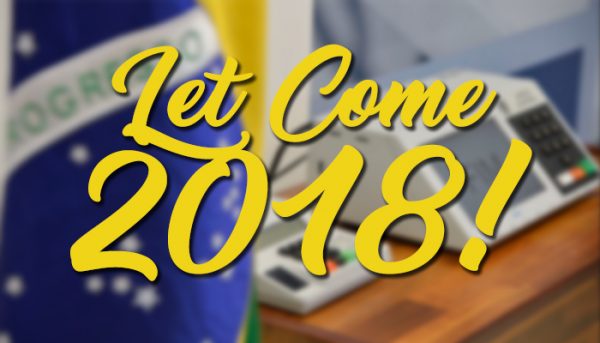12/2017
By Ricardo Amorim

Despite the political chaos, in 2017 Brazil finally left behind the deepest, longest and hardest economic depression in its history. The GDP grew in the 3 first quarters of the year and indicators suggest that the pace of growth accelerated in the 4th quarter. The confidence of consumers and businessmen in all sectors of the economy is improving since 2015. Jobs started to reappear since April and 2.3 million previously unemployed people are back at work. The new labour legislation should help maintain this trend.
With inflation collapsing to the lowest level in 20 years, the Selic rate has also fallen to its lowest in History. This has recently started to propel durable goods sectors – which are always the last to recover after any economic crisis. Production and sales of vehicles grew more than 40% in October as compared to October 2016 and real estate sales grew more than 20% this year. Corrugated paper sales – the best indicator of industrial expectations for the future – grew 4% in the year and 8% in the last month. Retail counts on the best Xmas in 3years, maybe in 5.
The future is always uncertain, and it is no different for 2018. Will the Social Security Reform and the Tax Reform be approved? If they are, they may contribute to improve public accounts and strengthen the competitiveness of the Brazilian economy, helping productive investment to increase and, consequently, helping more jobs to be created along with faster and more lasting growth.
The election next year is still clad in major uncertainty. We still don’t know for sure who the candidates will be, let alone what they’ll do if elected. Despite that, the risk of a substantial swerve in the economic policies, capable of jeopardizing recovery, seems to be relatively limited.
The main concerns would come from Lula being elect President, but this possibility is more remote than it seems. In January the TRF-4 must decide on Lula’s appeal on Judge Sérgio Moro’s decision which sentenced him to 9,5 years in prison. In 70% of their decisions on 1st instance Courts concerning Lava-Jato cases the TRF-4 not only confirmed condemnations but also enhanced the sentences given by Moro. With the condemnation maintained, even if softened, Lula shall become a “ficha suja” (dirty record) and prevented to run for election. In the event of condemnation there may be an embargo by Lula’s defence, but embargoes are usually rejected. An appeal to the Supreme Court (STF) would still be possible, but Lula would nevertheless be prevented from participating in the election. The chance that Lula becomes a candidate is therefore less than 30%.
Moreover, even if he is a candidate, his chance of being elected is less than a quick reading of the recent electoral polls might indicate. The same polls show that most voters haven’t yet opted for any of the candidates and Lula – along in fact with most known candidates-to-be – enjoys a rejection rate higher than his approval rates, which preserves the uncertainty surrounding the election.
The last issue is, if elected, would Lula radically change the economic policy thus jeopardizing the recovery? Possible but improbable. Let us remember that when he took office in 2002 he did precisely the opposite, making President of the Central Bank the current Finance Minister Henrique Meirelles, a well respected international banker then just elected to Congress as member of the PMDB. Lula is upset with “the elites” and threatened by a growing number of legal suits, so a different attitude can be expected if he gets to the Presidency again, but freedom of the Press and the independence of the Judiciary seem much more at risk than the economic policy.
Lula is not the only one who, if elected, may perhaps radically change economic policies, risking the economic recovery. Ciro Gomes, Marina da Silva and Jair Bolsonaro also represent some risk, but the chances of Ciro Gomes being the next president seem slim, and Marina and Bolsonaro have been giving increasing support to the current economic policies. We will only be sure that their conversion to economic orthodoxy is genuine if they are elected, but the risk of economic insanity seems to be shrinking.
The other potential candidates that can be detected – Henrique Meirelles, Geraldo Alckmin, João Dória, João Amoedo and Álvaro Dias – have enormous differences among themselves, but neither of them supports changes in economic policy that would put recovery at risk.
In summary, electoral risks exist – also because it is impossible to discard the appearance of other competitive candidates – but they seem limited. External risk – a war or a global financial crisis – may even be more significant, but at the end of the day, if no such risk materializes, it is most probable that the growth of the Brazilian economy in 2018 and in the following years will exceed, maybe by much, the average 2% a.a. expectation by the majority of economists.
Ricardo Amorim is the author of the best-seller After the Storm, a host of Manhattan Connection at Globonews, the most influential economist in Brazil according to Forbes Magazine, the most influential Brazilian on LinkedIn, the only Brazilian among the best world lecturers at Speakers Corner and the winner of the “Most Admired in the Economy, Business and Finance Press”.
Click here and view Ricardo’s lectures.
Follow me on: Facebook, Twitter, YouTube, Instagram e Medium.
Translation: Simone Montgomery Troula